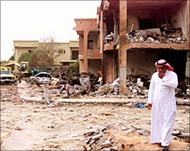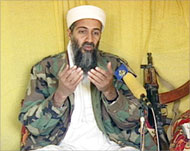King Fahd crackdown may spur mujahidin
King Fahd’s attempt to stamp out what he calls extremist preaching from his Saudi kingdom’s mosques could backfire, warned clerics and analysts.

Critics say the clampdown will only serve to drive young Saudi men to Iraq to fight in a holy war against the American “satan”.
King Fahd’s warning for clerics to stop preaching militant messages was seen as a response to accusations last week by US Deputy Secretary of State Richard Armitage said last.
Armitage said that some of those attacking occupying forces in Iraq were coming into the country from neighbouring Saudi Arabia.
However, in an official statement on Sunday, Saudi Arabia said there was no proof yet that any of its citizens were involved in the bombing in the Iraqi Shiite holy city of Najaf.
The statement challenged those who made the accusations to deliver concrete proof.
Hours earlier, the leading cleric Mohsen al-Awajy said: “Most youth think the only safe road is to go to Iraq. They are trapped between the international campaign against terrorism and this campaign at home.”
Safe haven
“The only safe haven for them is to go to Iraq. We are hearing stories of families who get mobile phone messages from their sons saying they’re going to Iraq.”
Awajy said thousands of Saudi veterans of the war against the Soviet occupation of Afghanistan in the 1980s, who at that time were supported by the government, were now being targeted.
The Saudi crackdown intensified after the May bombings in Riyadh, which killed 35 people, including nine Americans. Authorities have arrested more than 200 militants believed linked to al-Qaida.
 |
|
Damaged buildings after an attack |
“In the Saudi streets, people are not happy with the mass operation against former mujahidin, who were encouraged by the Saudi government. Without US pressure, our own government would not be as harsh against their own people,” Awajy added.
Saudi Interior Minister Prince Nayef has denied Saudi nationals have been pouring over the long porous border into Iraq, saying in remarks published on Saturday that any Saudis in Iraq must have entered through a third country.
New generation mujahidin
Political analyst Dawoud al-Shiryan said it was clear from the age profile of dozens of Saudis wanted, arrested or shot in a series of skirmishes between militants and police in recent months that this was a new generation of mujahidin.
“The problem is the new generation. People in their 20s, most of them born after the Iranian revolution. The security solution is not enough. These people are willing to die, and we have a lot of jobless and economic problems.
“When Saudis go to Iraq it’s partly because of these pressures. You cannot take away 30 years of something with a few sermons. It needs a major plan in culture, media and education.”
London-based dissident Muhammad al-Massari said Saudi police, long sidelined by the powerful morality police in this strict Islamic state, were ill-equipped to confront an insurgency.
Pro-bin Ladin
“The training is miserable and the psychological preparation is very bad. A big percentage of the police will be pro-bin Ladin,” Massari said.
“The militants are not willing to be taken into custody without a fight. Most of the fights have been bloody and the government does not announce every fight,” he added.
The Saudi Foreign Ministry has made it mandatory to have security guards at schools, Western food franchises and foreign airline offices and travel agencies in the kingdom.
Usama bin Ladin has repeatedly called for jihad (holy struggle) against “infidel” countries, urging his followers to target Western interests.
“The main reason there was no militant action in Saudi (against the government) in the last 10 years was ideological – it would have involved Muslims getting killed,” Massari said.
“Now people are getting over this, but those hesitating can go to Iraq, it’s a paradise.”
King Fahd is said to be increasingly concerned about the situation and responded on Sunday by ordering Muslim clerics to combat hardline ideologies, which he said were harming the kingdom and Islam.
 |
|
Usama bin Ladin: Adored by |
Saudi Arabia, birthplace of al-Qaida figurehead bin Ladin, is trying to crush Islamist dissidents at home and improve its image abroad after the September 11 attacks on US cities two years ago and bombings in Riyadh in May.
“Ignorance has penetrated some of the nation’s youth and tempted terrorist networks to use them for aims which only serve the nation’s enemies and harm Islam and Muslims and open the door for accusations against Islam of violence and terrorism,” King Fahd said in a speech that appeared in Sunday’s papers.
“Brothers… what is needed is reforming this deviant and strange thinking by delivering the correct message at mosques against excess in religion,” he said.
US ally under pressure
His speech to an Islamic conference on Saturday comes as the United States steps up pressure on its key regional political and economic ally, to crack down on Muslim fighters and reform its powerful religious establishment which has been accused in the West of breeding hatred towards Christians and Jews.
|
Washington has welcomed what it sees are signs that Saudi leaders are finally taking a stand against violent elements. |
King Fahd told the gathering of clerics from across the Muslim world that the duty of mosques was to preach peace, security, cooperation, justice and tolerance.
Washington has welcomed what it sees are signs that Saudi leaders are finally taking a stand against violent elements, who might threaten not only Western interests, but the power of the Saudi royal house itself.
Bin Ladin has often called for jihad against the United States, and has deemed Saudi rulers infidels because of their ties to the West.
Campaign against extremists
The 11 September 2001 attacks were carried out mainly by Saudi hijackers loyal to bin Ladin, and al-Qaida is also thought to be behind the triple bomb attacks on housing compounds in Riyadh which killed 35 people, including nine Americans.
Riyadh intensified its campaign against armed dissidents after the May bombings, leading to several bloody clashes between police and Islamist fighters and to the arrest of more than 200 suspects.
Authorities have dismissed 700 clerics and banned around 1500 from preaching in mosques for inciting dissent.